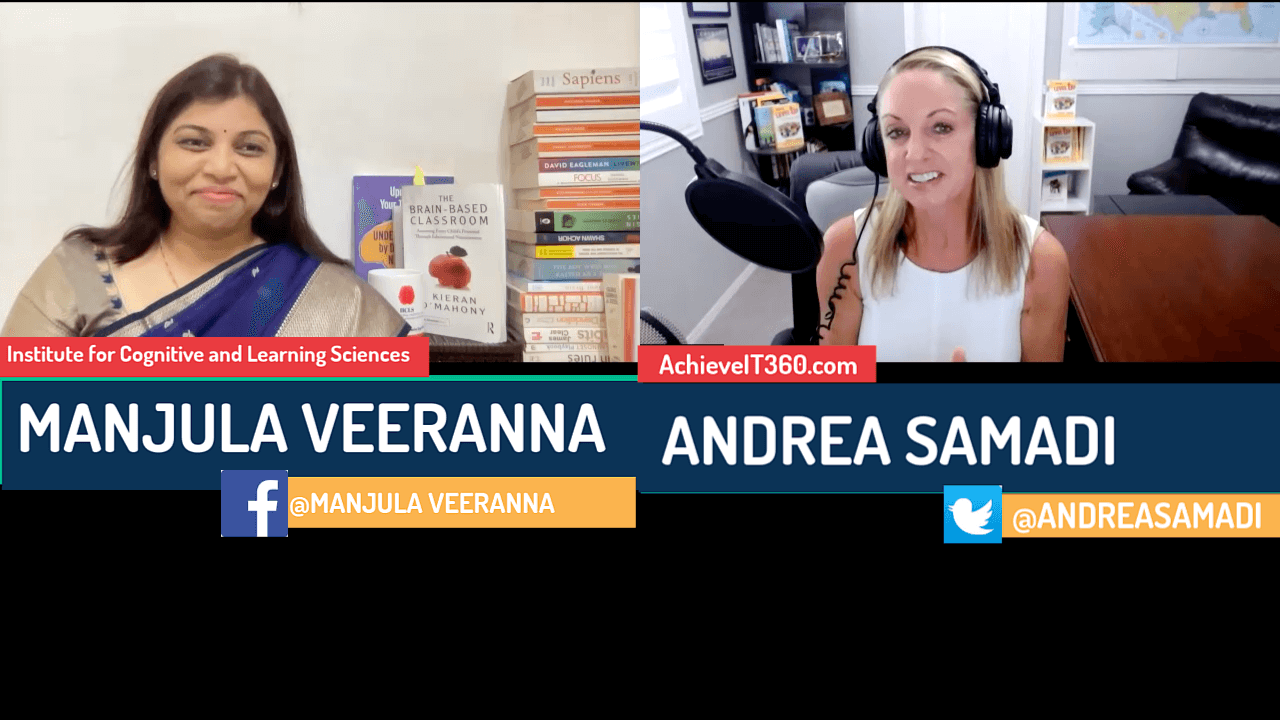Welcome to The Neuroscience Meets Social and Emotional Learning Podcast, where we cover the science-based evidence behind social and emotional learning (for schools) and emotional intelligence training (in the workplace) with tools, ideas and strategies that we can all use for immediate results. When we understand how the brain works, we can be better equipped to help our students focus their attention and improve their results.
Watch this interview on YouTube here https://youtu.be/jqRo1e30PkM

I’m Andrea Samadi, an author, and educator with a passion for learning specifically on the topics of health, wellbeing and productivity, and launched this podcast to share how important an understanding of our brain is to our everyday life and results--whether we are a teacher in the classroom, or in the modern workplace. We have moved onto Season 8 of the podcast with a focus on our brain as it relates to learning, and today we have a case study, of someone who has been using the concepts she learned from self-study to create a brain-based program in her schools and community in India where they have already trained over 300 educators with her curriculum at the Institute of Cognitive Learning Sciences.[i]
On the episode you will learn:
✔ How an ambitious, forward-thinking educator, has created brain-based K-12 curriculum in India.
✔ How Manjula learned the most current neuroscience research before seeking out a certification with Dr. Kieran O’Mahony.
✔ The differences Manjula saw with the US Educational System and India.
✔ How she plans to impact change in the classroom, one teacher at a time.
Manjula sent me a message via my website, all the way from India, letting me know that she had listened to EPISODE #220[ii] with Dr. Kieran O’Mahony and Rich Carr on “Brain Centric Design” and she let me know she was a student of Dr. Kieron’s programs, and wanted to share what she was doing in India. I could tell that she was very excited about the work they were doing and so I wrote back quickly, and we set up a Zoom call to talk. I will let Manjula explain what she is doing with schools in India, the need she saw to change the way typical classrooms were operating by inspiring teachers, not forcing them to do something they didn’t want to do. She shared with me how she began to study neuroscience using as much free content as she could find online, (including our podcast) before she became certified, and began creating change one school at a time in India.
When you meet Manjula, I’m hoping that she will inspire you to keep searching for those students who need a bit of a push to reach their full potential. She was told as a young girl that she was below-average in school, and felt disconnected with her grades, but as she grew older, she wanted to prove to herself (and others) that she did indeed have unlimited potential and the will to make significant change in her community. You can’t miss the fire in her spirit. Let’s meet Manjula from India, and see how she is using brain-based learning to inspire students in the classroom.
Welcome Manjula, it’s wonderful to see you again. I’ve got to say, it was powerful meeting you yesterday on Zoom, and hearing about the work you are doing in India.
INTRO Q: To open up, can you share your story and background. What is life like growing up, and going to school in India?
Q1: How did you become interested in studying and learning about the brain? What resources did you learn from in the very beginning? Who have you been learning from?
Q2: What training did you take after you began to see how brain-based education could help students and teachers in India?
Q3: Who inspired you to reach for your highest potential in life?
Q4: When did you see that change towards brain-based learning was needed?
Q5: What did you notice about the differences between what family/school/student life is like in India vs the United States where you were learning your training? (values).
Q6: Do teenagers in India do the eye-roll (that I see often in the US) when asked to do something?
Q7: What did you create for the K-12 school market in India? What training do you offer?
Q8: What is the vision for what you are building?
Q9: Is there anything important that I have missed?
Thank you Manjula for sharing your story, program and vision for the future in education. You have created something incredible that I know will open up the eyes of those around the world who also share your vision. If people want to learn more about your programs, what is the best way?
RESOURCES AND LINKS TO LEARN MORE ABOUT MANJULA’S WORK
https://www.youtube.com/c/pipaltreeeducation/videos
https://www.youtube.com/channel/UCp4XzzafTYNihURdODM4YAw
https://www.youtube.com/watch?v=sjwUvDFf3I0
https://www.linkedin.com/in/manjula-veeranna/
https://www.facebook.com/manjula.veeranna.3
FOLLOW ANDREA SAMADI:
YouTube Channel: https://www.youtube.com/c/AndreaSamadi
Website https://www.achieveit360.com/
LinkedIn: https://www.linkedin.com/in/samadi/
Facebook: https://www.facebook.com/Achieveit360com
Neuroscience Meets SEL Facebook Group https://www.facebook.com/groups/2975814899101697
Twitter: https://twitter.com/andreasamadi
Instagram: https://www.instagram.com/andreasamadi/
OTHER RESOURCES:
Wendy Suzuki https://www.wendysuzuki.com/
REFERENCES:
[i] https://www.linkedin.com/in/manjula-veeranna/
[ii] Neuroscience Meets SEL Podcast EPISODE #220 with Dr. Kieran O’Mahony and Rich Carr on “Brain Centric Design” https://andreasamadi.podbean.com/e/rich-carr-and-dr-kieran-o-mahony-from-brain-centric-design-on-the-surprising-neuroscience-behind-learning-with-deep-understanding/
No comments yet. Be the first to say something!